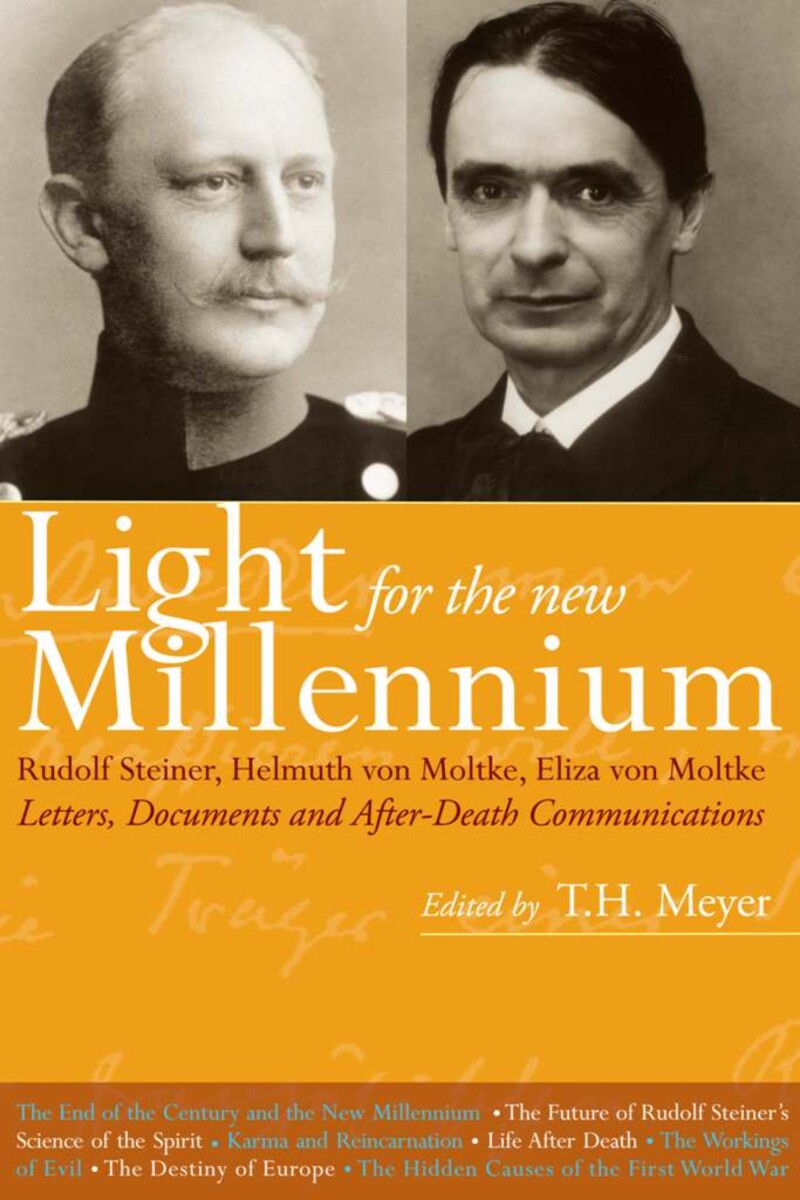Light for the New Millennium
Letters, Documents and After-death Communications
Edited by T. H. Meyer
Contributions by Johannes Tautz
Translated by Martin Askew, Heidi Hermann-Davey and William Forward
- Publisher
Rudolf Steiner Press - Published
11th August 2014 - ISBN 9781855844001
- Language English
- Pages 396 pp.
- Size 6.125" x 9.25"
Containing a wealth of material on a variety of subjects, Light for the New Millennium tells the story of the meeting of two great men and their continuing relationship beyond the threshold of death: Rudolf Steiner (1861-1925)—the seer, scientist of the spirit, and cultural innovator—and Helmuth von Moltke (1848-1916)—a renowned military man, Chief of the General Staff of the German army during the outbreak of World War I.
In 1914, following disagreements with the Kaiser, Moltke was dismissed from his post. This led to a great inner crisis in the General, that in turn drew him closer to Steiner. When Moltke died two years later, Steiner maintained contact with his excarnated soul, receiving communications that he passed on to Moltke’s wife, Eliza. These remarkable and unique messages are reproduced here in full, together with relevant letters from the General to his wife. The various additional commentaries, essays and documents give insights to themes of continuing significance for our time, including the workings of evil; karma and reincarnation; life after death; the new millennium and the end of the last century; the hidden causes of World War I; the destiny of Europe, and the future of Rudolf Steiner’s science of the spirit.
Also included are Moltke’s private reflections on the causes of the Great War ("the document that could have changed world history"), a key interview with Steiner for Le Matin, an introduction and notes by T. H. Meyer, and studies by Jürgen von Grone, Jens Heisterkamp and Johannes Tautz.
C O N T E N T S:
Foreword to the English Edition
Introduction by Thomas H. Meyer
Helmuth von Moltke and Rudolf Steiner by Johannes Tautz
PART ONE
1. Letters from Helmuth von Moltke to Eliza von Moltke 1877–1914
2. Helmuth von Motlke’s Appraisal of the Political Situation Three Days before the War
3. Letters from Helmuth von Moltke to Eliza von Moltke after the Outbreak of War
4. Helmuth von Moltke on the Retreat from the Marne
5. A Document that Could Have Changed World History
PART TWO
1. Letters and Verses from Rudolf Steiner to Eliza and Helmuth von Moltke
2. Helmuth von Moltke’s Death
3. After-death Messages from Helmuth von Moltke and Relevant Documents
Notes
Index
Rudolf Steiner
Rudolf Steiner (b. Rudolf Joseph Lorenz Steiner, 1861–1925) was born in the small village of Kraljevec, Austro-Hungarian Empire (now in Croatia), where he grew up. As a young man, he lived in Weimar and Berlin, where he became a well-published scientific, literary, and philosophical scholar, known especially for his work with Goethe’s scientific writings. Steiner termed his spiritual philosophy anthroposophy, meaning “wisdom of the human being.” As an exceptionally developed seer, he based his work on direct knowledge and perception of spiritual dimensions. He initiated a modern, universal “spiritual science” that is accessible to anyone willing to exercise clear and unbiased thinking. From his spiritual investigations, Steiner provided suggestions for the renewal of numerous activities, including education (general and for special needs), agriculture, medicine, economics, architecture, science, philosophy, Christianity, and the arts. There are currently thousands of schools, clinics, farms, and initiatives in other fields that involve practical work based on the principles Steiner developed. His many published works feature his research into the spiritual nature of human beings, the evolution of the world and humanity, and methods for personal development. He wrote some thirty books and delivered more than six thousand lectures throughout much of Europe. In 1924, Steiner founded the General Anthroposophical Society, which today has branches around the world.
Helmuth von Moltke
Helmuth Johannes Ludwig Gra von Moltke (1848–1916), also known as Moltke the Younger, was a German general who served as the Chief of the German General Staff from 1906 to 1914. General von Moltke was also a follower of Theosophy.
Eliza von Moltke
No information


